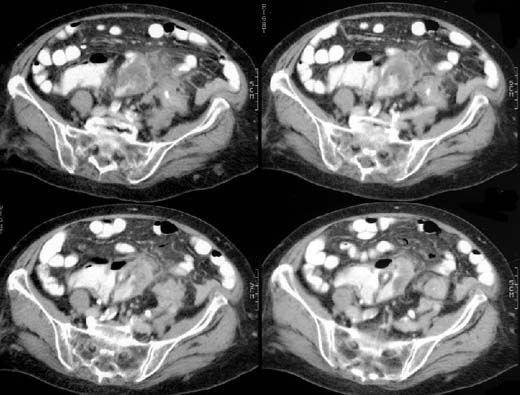
A CT (Computed Tomography) scan with rectal
contrast is a medical imaging test that uses X-rays and computer technology to
produce detailed cross-sectional images of the rectum and surrounding tissues.
A CT
scan with rectal contrast is typically performed to :
Evaluate rectal cancer : To diagnose and stage rectal cancer, and to monitor treatment
response.
Investigate rectal symptoms : To evaluate symptoms such as rectal bleeding, pain, or difficulty
with bowel movements.
Detect rectal abnormalities : To detect abnormalities such as rectal polyps, diverticulitis, or
rectal prolapse.
1. Preparation : You will be asked to prepare for the test by emptying your bowels
and removing any metal objects.
2. Rectal contrast administration : A rectal contrast agent will be administered through the rectum
to help visualize the rectum and surrounding tissues.
3. CT scanning : You will lie on a table that slides into a large, doughnut-shaped
machine. The CT scanner will rotate around you, taking X-ray images from
different angles.
Benefits of a CT scan with rectal contrast
Ø Detailed images : CT scans with
rectal contrast provide detailed images of the rectum and surrounding tissues,
helping doctors diagnose and treat conditions more effectively.
Ø Minimally invasive : CT scans
with rectal contrast are minimally invasive, reducing the risk of complications
and promoting faster recovery.
Ø Quick procedure : CT scans with
rectal contrast are relatively quick, taking about 10-30 minutes to complete.
Common conditions diagnosed with a CT
scan with rectal contrast :
Ø Rectal cancer
Ø Rectal polyps
Ø Diverticulitis
Ø
Rectal prolapse
Ø Inflammatory bowel disease_ (e.g., ulcerative colitis or Crohn's
disease)
DIAGNOSTIC BENFITS :
Ø Accurate diagnosis : CT scans
with rectal contrast provide detailed images of the rectum and surrounding
tissues, helping doctors diagnose conditions more accurately.
Ø Early detection : CT scans with
rectal contrast can detect rectal abnormalities at an early stage, allowing for
prompt treatment and improving patient outcomes.
Ø Staging of rectal
cancer : CT scans with rectal contrast can help
stage rectal cancer, which is essential
for planning treatment.
TREATMENT BENEFITS :
Ø Surgical planning : CT scans with
rectal contrast provide detailed information about the anatomy of the rectum
and surrounding tissues, helping surgeons plan and execute surgical
interventions.
Ø Monitoring treatment response :
CT scans with rectal contrast can be used to monitor the response to treatment,
such as chemotherapy or radiation therapy.
Ø Reducing complications : CT scans with rectal contrast can help reduce complications during
surgery by providing detailed information about the anatomy of the rectum and
surrounding tissues.
PATIENT BENEFITS :
Minimally invasive : CT scans with rectal contrast are minimally invasive, reducing the
risk of complications and promoting faster recovery.
Ø Quick procedure : CT scans with
rectal contrast are relatively quick, taking about 10-30 minutes to complete.
Ø Less discomfort : CT scans with
rectal contrast are generally less uncomfortable than other diagnostic tests,
such as colonoscopy.
